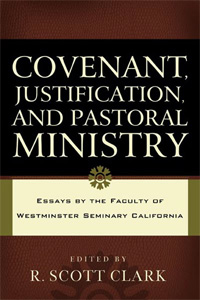Preaching begins with Bible reading and interpretation. Before a minister can preach a given text, he must decide what it says. To interpret a passage, the preacher necessarily brings to bear his broader reading of Scripture, a system of doctrine, and the history of interpretation. Continue reading →
Covenant, Justification, and Pastoral Ministry
Faith Formed By Love Or Faith Alone? The Instrument Of Justification
In his discussion of works, Calvin anticipates the great error of many contemporary critics of the Reformation doctrine. They think that as long as they say that salvation is by grace alone they have said all they need to say theologically, but many medieval theologians said exactly that. They taught that grace alone worked to transform and sanctify the life and that all the works of the Christian are the fruit of grace. Such an improved life, however, is still an imperfect life and cannot stand in the judgment. Calvin summarizes the situation succinctly: “If righteousness is revealed in the gospel, surely no mutilated or half righteousness but a full and perfect righteousness is contained there. The law therefore has no place in it” (Institutes 3.11.19). What one needs to stand in the judgment, Calvin declares over and over again, is a perfect righteousness. No matter how much progress one makes in grace during this life, so that one’s life becomes holier, holier, and holier, it will never get to the point where it will be able to stand in the judgment. Continue reading →
Explaining the Nine Points of Synod Schereville
In 2007 the Synod the United Reformed Churches in North America adopted a statement of pastoral advice concerning the self-described “Federal Vision” theology. One of the main matters of business at Synod Schereville was to address an overture brought by Classis Michigan regarding the Federal Vision theology. As part of dealing with that overture Synod took two actions. First it re-affirmed and strengthened the language first adopted at Synod Calgary regarding justification by faith alone (sola fide). Continue reading →
Does Covenant Theology Change Our Doctrine Of Predestination?
HB reader Keith asks, Succinctly, what is covenant theology on the following: Predestination Security of the believer? Hi Keith, The short answer is that the covenant theology that we confess does not fundamentally change our doctrine of predestination, which says that all . . . Continue reading →
Theological Error Seeps In
Years ago, in the second house in which Mrs Heidelblog and I lived, water seeped into the basement every time it rained and it rained frequently. As the ground became soaked water would push in and up through the basement. We had . . . Continue reading →
When The Good News Becomes Bad
The word “Gospel” is so familiar and frequently used that it is possible to lose sight of its genuine meaning, “good news.” This question is vital as we face a series of movements within our churches which seek to redefine the meaning . . . Continue reading →
Does Baptism Save?
Merrit asks this question. “Two friends and I have been talking about this verse (1 Peter 3:21) and passage for quite some time today. The more we seem to talk about it the more confused I seem to get about it.” Merritt, . . . Continue reading →
Faith Alone Is The Instrument Of Justification AND Salvation
Controversy can be ugly and painful and the recent controversy over sanctification has been both at times. It can also be helpful by bringing greater clarity and this controversy has been useful in that respect. Some orthodox Reformed pastors are being charged . . . Continue reading →
ReformedCast: On The Distinction Between The Law And The Gospel
Thanks to Scott Oakland for inviting me to do episode 145 of the ReformedCast. We talked about the distinction between law and gospel. Scott asked good questions and we were able to cover a lot of what is currently being discussed now: . . . Continue reading →
Economics, Trust, Imputation, and Worth (Updated)
Shocking as it may be, courses in medieval history and theology do not always have immediate relevance to late modern society. There is a theme in medieval history and theology, however, that does illumine what is happening to the global economy. Since . . . Continue reading →
"Sola Fides" is not Sola Fide
I’m reading Rowan Williams on Arius. Early in the book he uses the expression “sola fides.” In context, he seems to be making an indirect reference to the Protestant doctrine of sola fide. I’ve seen this in other writers. When I first noticed . . . Continue reading →
Striking At The Vitals Of Religion: Understanding The Federal Vision (Links Updated)
Enough time has passed since the FV matter was addressed decisively, ecclesiastically, in 2007, that not everyone may be equally aware of what it is and why it matters. Here are some resources: Covenant, Justification, and Pastoral Ministry: Essays by the Faculty . . . Continue reading →
If You’re Waiting To Order Your Copy… (Updated)
If you’ve been thinking about ordering CJPM but have been waiting, the window of opportunity to get your copy is closing. The WSC Bookstore is out and they were told by P&R that the book is out of print. Amazon still has . . . Continue reading →
Justification and Vindication
One of the more disturbing aspects of the Federal Vision program is its doctrine of final justification. Let’s be clear here: Protestants have no such thing. We do not not equivocate (use the same word in two senses at the same time) . . . Continue reading →
Should Reformed Theology Move Beyond Covenant Theology?
I. SUMMARY In a post (HT: Aquila Report) dated Friday 9 August, Bill Evans raises the question whether there is in Reformed theology what he calls “pervasive covenantalism” or an over emphasis or imbalanced emphasis in Reformed theology on covenant. He points to . . . Continue reading →
The Arminius Paradigm
For some time the Federal Visionists have been arguing that no one should criticize the Federal Vision until the church courts ruled on it. This is a strange argument since, on that basis Luther couldn’t have replied to Erasmus (the Augsburg wouldn’t . . . Continue reading →
Synod Of Dort Day: Arminius Brought Out Of Hell
[We reject the errors of those] Who teach: That Christ by His satisfaction merited neither salvation itself for any one, nor faith, whereby this satisfaction of Christ unto salvation is effectually appropriated; but that He merited for the Father only the authority . . . Continue reading →
CJPM Now Available as an E-Book
What Henk Navis Means to Me
Unlike Father Neuhaus, I guess few readers of this space will know who Henk Navis was, but he died today. Henk did not participate in any famous negotiations with anyone. He did not leave one communion for another. He wasn’t celebrated or . . . Continue reading →
By the Power of His Deity
Heidelberg Catechism Q. 17: 17. Why must he also be true God? That by the power of His Godhead He might bear in His manhood the burden of God’s wrath,1 and so obtain for 2 and restore to us righteousness and life.3 . . . Continue reading →













